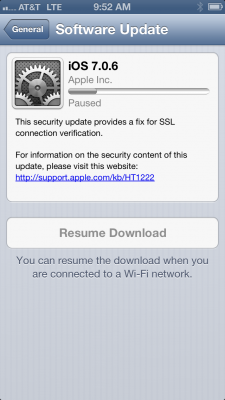iOS Update Quashes Dangerous SSL Bug
Originally posted by briankrebs_rss at iOS Update Quashes Dangerous SSL Bug - this post discusses the Apple SSL bug, why it's scary, and what actions you can take. - maxomai
http://krebsonsecurity.com/2014/02/ios-update-quashes-dangerous-ssl-bug/
http://krebsonsecurity.com/?p=25089
Apple on Friday released a software update to fix a serious security weakness in its iOS mobile operating system that allows attackers to read and modify encrypted communications on iPhones, iPads and other iOS devices. The company says it is working to produce a patch for the same flaw in desktop and laptop computers powered by its OS X operating system.

The update - iOS 7.0.6 - addresses a glaring vulnerability in the way Apple devices handle encrypted communications. The flaw allows an attacker to intercept, read or modify encrypted email, Web browsing, Tweets and other transmitted data, provided the attacker has control over the WiFi or cellular network used by the vulnerable device.
There has been a great deal of speculation and hand-waiving about whether this flaw was truly a mistake or if it was somehow introduced intentionally as a backdoor. And it’s not yet clear how long this bug has been included in Apple’s software. In any case, if you have an iPhone or iPad or other iOS device, please take a moment to apply this fix.
Generally, I advise users to avoid downloading and installing security updates when they are using public WiFi or other untrusted networks. On the surface at least, it would seem that the irony of this situation for most users is that iOS devices will download updates automatically as long as users are connected to a WiFi network. But as several folks have already pointed out on Twitter, Apple uses code-signing on iOS and app updates to ensure that rogue code can’t be pushed to devices.
I will update this post when Apple ships the patch for OS X systems. For now, it may be wise to avoid using Safari on OS X systems. As Dan Goodin at Ars Technica writes, “because the Google Chrome and Mozilla Firefox browsers appear to be unaffected by the flaw, people should also consider using those browsers when possible, although they shouldn’t be considered a panacea.”
For a deeper dive on this vulnerability and its implications, check out this piece by Larry Seltzer at ZDNet, and this analysis by Google’s Adam Langley.
http://krebsonsecurity.com/2014/02/ios-update-quashes-dangerous-ssl-bug/
http://krebsonsecurity.com/?p=25089
Apple on Friday released a software update to fix a serious security weakness in its iOS mobile operating system that allows attackers to read and modify encrypted communications on iPhones, iPads and other iOS devices. The company says it is working to produce a patch for the same flaw in desktop and laptop computers powered by its OS X operating system.

The update - iOS 7.0.6 - addresses a glaring vulnerability in the way Apple devices handle encrypted communications. The flaw allows an attacker to intercept, read or modify encrypted email, Web browsing, Tweets and other transmitted data, provided the attacker has control over the WiFi or cellular network used by the vulnerable device.
There has been a great deal of speculation and hand-waiving about whether this flaw was truly a mistake or if it was somehow introduced intentionally as a backdoor. And it’s not yet clear how long this bug has been included in Apple’s software. In any case, if you have an iPhone or iPad or other iOS device, please take a moment to apply this fix.
Generally, I advise users to avoid downloading and installing security updates when they are using public WiFi or other untrusted networks. On the surface at least, it would seem that the irony of this situation for most users is that iOS devices will download updates automatically as long as users are connected to a WiFi network. But as several folks have already pointed out on Twitter, Apple uses code-signing on iOS and app updates to ensure that rogue code can’t be pushed to devices.
I will update this post when Apple ships the patch for OS X systems. For now, it may be wise to avoid using Safari on OS X systems. As Dan Goodin at Ars Technica writes, “because the Google Chrome and Mozilla Firefox browsers appear to be unaffected by the flaw, people should also consider using those browsers when possible, although they shouldn’t be considered a panacea.”
For a deeper dive on this vulnerability and its implications, check out this piece by Larry Seltzer at ZDNet, and this analysis by Google’s Adam Langley.